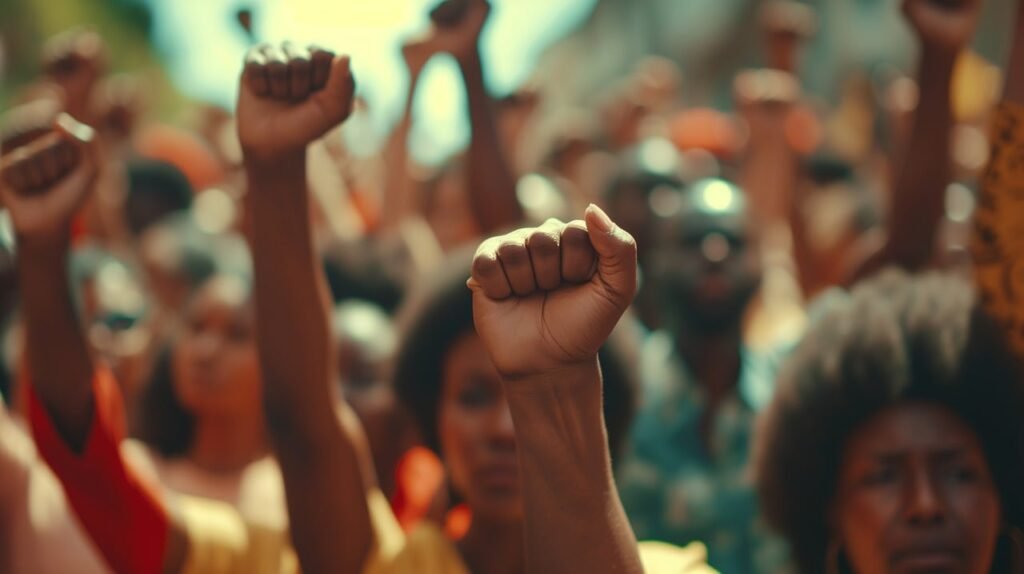TL;DR:
- “Woke” originated in 1938 in Lead Belly’s song and became mainstream in 2012.
- Influential events: Post-WWI racial tensions, Civil Rights Movement, Black Lives Matter, #MeToo, LGBTQ+ movements.
- Criticisms: Excessive focus on identity politics, political correctness, cancel culture, and virtue signaling.
- Impact on politics: Causes division and polarization in discourse and policy.
- Corporate America: Companies adopt diversity initiatives but face backlash for perceived insincerity.
- Public opinion increasingly critical of woke culture’s potential to stifle free speech and create social tension.
- Future implications may include increased polarization and challenges to social cohesion.
Introduction
Have you heard people talking about “US woke culture” and wondered what it means? This term has become a hot topic in recent years, causing both praise and criticism. US woke culture refers to a growing awareness of social issues, especially those related to race, gender, and equality. It started in African American communities and gained widespread attention after the Trayvon Martin case in 2012. Today, US woke culture impacts everything from politics to entertainment. Some people think it’s necessary for creating a fairer society, while others worry it’s causing more problems than it solves. In this article, we’ll explore where US woke culture came from, how it’s changing America, and why it’s so controversial.
Understanding the Origins of US Woke Culture
“Woke” originated in African American Vernacular English and first appeared in the 1938 song “Scottsboro Boys” by Lead Belly. It urged people to stay alert to racial injustices.
The term gained mainstream attention in 2012 with the hashtag #staywoke after Trayvon Martin’s tragic shooting. By 2017, Merriam-Webster defined “woke” as being aware of significant issues, particularly those involving racial and social justice.

Key Milestones:
- 1938: Lead Belly’s “Scottsboro Boys” introduces “woke” for racial awareness.
- 2012: The #staywoke hashtag gains popularity after Trayvon Martin’s shooting.
- 2010s: “Woke” connects closely with the Black Lives Matter movement.
- 2017: Merriam-Webster defines “woke” in terms of social and racial awareness.
Over time, “wokeness” expanded from racial issues to various social injustices, including gender and sexuality. It reflects a broader understanding of social justice, where being “woke” involves challenging systemic inequalities. Today, “woke” influences discussions about identity, equity, and rights in modern America, often leading to contentious debates.
The Evolution of Woke Culture in American Society
Historical Influences
After World War I, Black veterans returned, asserting their rights and facing increased racial tensions and violence, including lynchings. This period paved the way for the Civil Rights Movement, where leaders like Martin Luther King Jr. emphasized awareness and action against systemic racism, embedding these ideas into public consciousness.
- Post-WWI: Black veterans’ rights assertions spark racial tensions.
- Civil Rights Movement: Leaders like MLK push for systemic change.
- Black Lives Matter: Highlights ongoing racial injustices, but faces criticism for methods.
- #MeToo Movement: Focuses on gender-based injustices, but accused of overreach.
- LGBTQ+ Rights Movement: Raises awareness for sexual orientation and gender identity issues, sparking cultural backlash.
Impact on Contemporary Understanding
The Civil Rights Movement laid a foundation by challenging segregation and discrimination, setting a template for future activism. However, recent movements like Black Lives Matter, #MeToo, and LGBTQ+ rights have been criticized for potentially divisive tactics and overemphasis on identity politics. These movements, while aiming to address injustices, have also been accused of creating new forms of discrimination and social tension.
Ongoing Influence
Woke culture permeates discussions on equity and identity, influencing policies and societal norms, often contentiously. It focuses on various social issues, creating a comprehensive yet potentially divisive understanding of justice beyond racial concerns.
This evolving perspective, while aiming for fairness and inclusivity, has been criticized for promoting a culture of victimhood and oversensitivity.

Criticisms and Controversies Surrounding US Woke Culture
Common Criticisms
Critics argue that woke culture focuses excessively on identity politics, promoting division by emphasizing differences over shared values. They also claim that political correctness stifles open dialogue, as expressing dissenting opinions may lead to severe backlash and social ostracism.
Cancel Culture Controversy
Cancel culture, often linked to woke culture, involves ostracizing individuals or entities for perceived insensitivity or offensive actions. It has sparked serious debates about free speech, with many viewing it as punitive and counterproductive. Critics suggest it often disregards intent and context, leading to unfair outcomes and a climate of fear.
High-Profile Examples:
- J.K. Rowling: Heavily criticized for comments on transgender issues, leading to boycotts.
- Kevin Hart: Lost Oscars hosting role due to past tweets, sparking debate on forgiveness.
- Gina Carano: Fired from The Mandalorian after controversial social media posts, raising concerns about ideological conformity.
- Dave Chappelle: Faced intense backlash for remarks in comedy specials, highlighting tensions between free speech and sensitivity.
Public Opinion Divide
Public opinion is increasingly critical due to differing views on its impact. While some see it as essential for addressing systemic inequalities and fostering inclusivity, a growing number see it as overreach, stifling free speech and promoting division. This group believes it often leads to polarization and a culture of fear around expressing unpopular opinions. The debate highlights woke culture’s complex and potentially detrimental role in shaping social awareness.
The Influence of Woke Culture on Politics and Media in the US
Impact on Political Discourse
Woke culture has shifted political discourse by prioritizing diversity, inclusion, and social justice, often at the expense of other important issues. Politicians increasingly incorporate these themes into their platforms, potentially alienating some constituents. This shift is visible in policy debates where issues like racial equity, gender rights, and LGBTQ+ protections are prioritized, sometimes overshadowing economic and security concerns.
The Free Speech Debate
Woke culture has intensified debates over free speech, with critics arguing it leads to censorship and self-censorship. As more people demand accountability for offensive speech, tensions rise over what counts as protected expression. This results in accusations of silencing dissent, especially in academic and media environments. The debate centers on balancing respectful dialogue with protecting open discourse, with growing concern that woke culture may be tipping the scales against free expression.
Media’s Role
Media amplifies narratives on woke culture through news, social media, and entertainment, often polarizing public opinion. Media outlets influence societal perceptions of social justice and equality, sometimes accused of bias in their framing. This framing can lead to increased polarization, as different media outlets present varied perspectives on woke culture’s impact, potentially exacerbating societal divisions.
US Woke Culture and Its Impact on Corporate America
Corporate Diversity Initiatives
Many companies have embraced diversity and inclusion as essential parts of their strategies, often in response to public pressure. Inspired by woke culture, businesses integrate these initiatives to attract socially conscious consumers and employees. This often involves forming diversity committees, implementing bias training, and setting diversity goals. However, these efforts have been criticized for potentially promoting reverse discrimination and prioritizing identity over merit.
Corporate Examples:
- Nike: Featured Colin Kaepernick in the “Just Do It” campaign, facing backlash and boycotts.
- Starbucks: Closed stores for racial-bias education training, criticized for being performative.
- Ben & Jerry’s: Actively supports social justice causes, accused of virtue signaling.
- Google: Regularly reports on workforce diversity statistics, but faces internal tensions over diversity policies.
Criticisms of Woke Capitalism
Critics argue woke capitalism often results in superficial actions rather than meaningful change. Many view these corporate initiatives as performative, accusing companies of virtue signaling, where actions focus more on public image than genuine commitment to social justice. Critics suggest businesses publicly endorse these causes but may not implement substantial internal changes, exploiting social issues for brand enhancement without addressing deeper systemic problems.
Reflection of Societal Tensions
The debate highlights the tension between authentic social responsibility and cynical marketing tactics. As consumers demand accountability, corporations face pressure to align with progressive values, often leading to accusations of insincerity. The line between genuine efforts and marketing ploys remains contentious. This debate mirrors societal tensions, questioning whether corporate actions contribute to social progress or serve as convenient branding strategies that ultimately exacerbate social divisions.
The Future of Woke Culture in US Society
Current Public Discourse
Public opinion on woke culture is increasingly polarized. While some advocates view it as essential for addressing social inequalities, a growing number of critics argue it stifles free speech and promotes unnecessary division. This divide is evident in media, politics, and everyday interactions, where discussions about identity, equality, and free expression become increasingly heated and unproductive.
Potential Future Impacts
These changes could lead to a more polarized society with deepening divides. As woke culture evolves, it might create a landscape where diverse voices are amplified, but at the cost of increased social tension and political polarization. The risk of further societal fragmentation is significant, with differing opinions on free speech and identity politics potentially leading to more entrenched societal conflicts. Balancing the pursuit of justice with maintaining open, respectful dialogue will be crucial, shaping a future that must navigate between progress and social cohesion.
Final Words
US woke culture has come a long way from its roots in African American communities. Today, it shapes debates on social justice across the country and even around the world. It affects how we talk about race, gender, and equality in politics, media, and business. Supporters of US woke culture say it’s needed to fix long-standing problems in society. Critics argue that it’s creating new forms of unfairness and making it hard for people to speak freely.
Whether you see US woke culture as a force for good or a source of division, there’s no denying its impact on American society. As this movement continues to evolve, it’s important for everyone to stay informed and think critically about its effects. The future of US woke culture and its role in shaping our society remains an open question. What’s clear is that it will continue to be a major topic of discussion and debate for years to come.
FAQ
What exactly is US woke culture?
US woke culture refers to a heightened awareness of social injustices, particularly those related to race, gender, and other aspects of identity. It encourages people to be alert to discrimination and to take action against it. However, some critics argue that it goes too far and creates new problems.
How did woke culture start in the US?
Woke culture in the US has its roots in African American communities. The term “woke” first appeared in a 1938 song about racial injustice. It gained wider popularity in 2012 with the hashtag #staywoke, used after the shooting of Trayvon Martin to encourage awareness of racial issues.
Why is US woke culture controversial?
US woke culture is controversial because people disagree about its effects. Supporters say it’s necessary to address long-standing injustices. Critics argue that it promotes division, limits free speech, and sometimes leads to unfair treatment of people who don’t agree with its ideas.
How does US woke culture affect businesses?
Many businesses have responded to US woke culture by implementing diversity and inclusion initiatives. This can include changes in hiring practices, employee training, and marketing strategies. Some companies face criticism for these efforts, with accusations of insincerity or “virtue signaling.”
What might be the future impact of woke culture in the US?
The future impact of woke culture in the US is uncertain. It could lead to more equality and awareness of social issues. However, it might also increase political and social divisions. The long-term effects will likely depend on how society balances the goals of social justice with concerns about free speech and social harmony.

